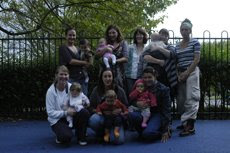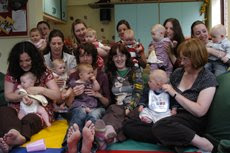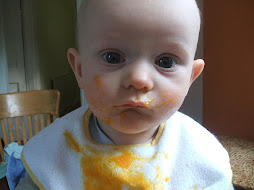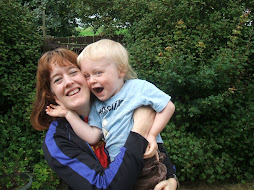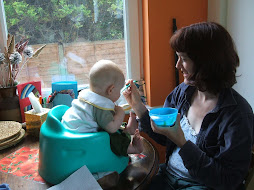On the perennially explosive topic that is breastfeeding, it
seems you have to declare your own experience at the outset, so that, like with
much else in life, people can pigeonhole you. I’ll oblige, although I don’t
really agree – I’ve had two children. Both times breastfeeding was difficult at
the outset, especially the first time. I was handed a bottle of formula in the
hospital because ‘baby might get jaundice’. With some persistence I managed to
breastfeed, although my first always had a little bottle of formula most days:
I’d not been able to shake the idea that my milk was ‘not enough’.
I do think that most women, given the right amount of time
and care, would be able to breastfeed for the first six months (beyond that I
don’t think is an area worth expending huge amounts of energy on) and this is
the most desirable outcome. I was always struck by the analogy of the Martian
looking down to Earth, being puzzled by seeing a new mother’s breasts fill with
milk who then gave the child a different form of sustenance.
This article is not to sing breastfeeding women’s praises
however, nor an indictment that all women should breastfeed. For those that
can’t or won’t that’s fine. I am more interested in the reactions and opinions
that surround the issue.
The three main reasons espoused by the breastfeeding lobby
are health, convenience and cost. The first is definitely a grey area, with
evidence emerging regularly to prove or disprove theories regarding health
benefits for mother and/or child and recently possible toxins in breastmilk
absorbed from our environment (The Guardian 23/6/2012). I’m a bottle fed baby
(my mother having been given no support) and I turned out just dandy. The other
two reasons are hard to argue with. Yes, if you’re bottle feeding someone else
can do it for you, freeing you up to go out, but seriously, it’s six months out
of your life. It may seem an eternity while you’re in it, but it’s not really.
The third speaks for itself really.
What intrigues me is the furore that is constant around the
whole issue. Bottle-feeding mothers assume that they are being looked down upon
by breast-feeding ones. Some feel guilty, others are defiant. Generally the
breast-feeding mothers I’ve met are not judging, they’re just getting on with
their lives, hoping their cracked nipples will recover and their thrush doesn’t
worsen into mastitis. Sadly I think this is yet another example where women are
pitted against each other, by themselves, the media and society in general. This
is intensely personal because it involves their bodies and it is an
oft-observed fact that women’s attention to their appearance is more for the
benefit of other women than attracting men, who are usually much more forgiving.
Very few articles I see on this subject acknowledge the fact
that the increased sexualisation of women’s bodies over the years has played a
part in the attitudes to breastfeeding. We have a strange dichotomy on our
hands. Many feel uncomfortable over women breastfeeding in public, yet we still
have the daily sexy tits shot in a tabloid. A recent article by Zoe Williams in The Guardian
discussed many of the issues around breastfeeding, but not that.
It also touched lightly on the even more thorny subject of
class:
‘The assumption tends to be that the kind of
people who breastfeed anyway and eat organic have no need of advice, while the
people to whom advice is dispensed are essentially counselled to act more like
the middle classes.’
This
was picked up someone commenting on the article. As a Spaniard, she doesn’t
realise that mentioning ‘class’ outright is for the English (not so much for
the rest of the UK,
I think) on a par with buggering the bursar.
‘In
this country, we have managed to turn breastfeeding into a class issue. As a
Spaniard living in the UK
for 24 years, it never ceases to amaze me how we again and again turn the most
innocuous subjects into class definers.’ Waybuloo, Comments
She
goes on to say that she wishes she hadn’t breastfed because ‘I can't bear to be thought of as in the
same camp as those breastfeeding nazis farting on and on.’
Again, a little harsh but it raises the uncomfortable fact
that breastfeeding is a class issue. Generally those that breastfeed are
middle class. Why is this? Is it as simple as the fact that they are raised or
live in households where the daily newspaper doesn’t display women’s breasts? A daily dose of titillating tits would surely make
most young girls believe that breasts not used in a sexual sense but as a food
source is somehow disgusting and dirty?
Women can often be their own worst enemies and this topic is
no exception. Claire Jones-Hughes organised a flashmob (literally) after her
upsetting treatment at the hands of some narrow-minded bullies who were upset
by her feeding her young baby in a café. This attracted a fair amount of media
attention, especially as it was in Brighton,
where we feed our babies until they’re 56. As a supporter of Claire, I posted a
link to the story on my Facebook page. An acquaintance of mine wrote: ‘How
disgusting. I would have gagged into my latte to see her feeding in public.
Don’t judge me, I have brought up three lovely bottle-fed children.’
Don’t judge me?! When she herself was judging? I removed the
remark from my page.
Feeling the battle is far from won, Claire is organising
another event – a picnic - for mothers, families and supporters. Having received
some flak for the first event from those claiming it was sensationalist and no
doubt criticism for daring to speak out in public at all, this event is a bit
different. She has described it thus:
‘No one is excluded, no matter how you fed your baby, come
and show solidarity with breastfeeding mothers. I'm extremely tired of certain
media publications using the issue to sell papers and dividing the public in
general. How we will ever hope to educate future generations of the benefits of
breastfeeding if the debate is trivialised and sensationalised?’
How indeed? The debate will rumble on for many decades, I
suspect.




